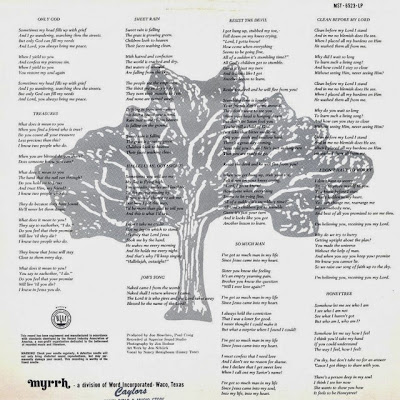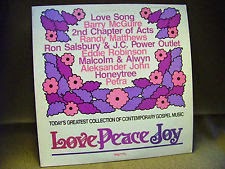 |
| HONEYTREE by Honeytree (1973) Myrrh Records (MST-6523-LP) |
Back in the early days of the Jesus Movement, the list of female solo artists was a very short one. There was Marj Snyder, Debby Kerner, and Jamie Owens, all from California Costa Mesa
Her given name was Nancy Henigbaum. “Henigbaum was German, and it means ‘honey tree’ if you translate it to English,” explains Nancy Sunrise
We’ve already talked about one Honeytree album on this list (#91 – 1979’S MARANATHA MARATHON). Check out that post if you’d like to catch up on the back story of Nancy
Honeytree's sister, who was studying at the Fort Wayne Art School in After taking a job as a secretary at the Adam's Apple, Honeytree began attending the group's Monday night Bible study. She also became immersed in the growing Christian folk music scene. "That was like college to me," she explained. "I worked there for five years right out of high school. Couldn't have gotten a better education." Honeytree began to write original Christian songs. When she was called on to lead a group of singers in worship, she sometimes added one of her own songs to the setlist. A minister, impressed with her music, borrowed money so that she could record and press her first album, Honeytree, in 1973.
Honeytree's musical influences were not traditional Christian musicians but mainstream female stars like Carole King, Judy Collins, and Joni Mitchell. There was nothing quite like
In fact, this album was chosen for this list based more on the historical significance of the record than the production values. Like most Jesus Music albums of the early 70s, it contained sparse production, short songs, and simple arrangements – very simple. But that’s precisely what gave Honeytree’s self-titled debut much of its charm. People love some albums because of things like sonic excellence or world-class musicianship; they love this album because they love these songs. And they love Nancy Honeytree.
The album’s first song, Only God, is a gentle ballad with an easy flow. Tasteful acoustic piano and electric guitar riffs abound as Honeytree makes a statement of faith right off the bat:
Only God can fill my need
Lord, You always bring me peace
The song seems to end way too soon. That’s true of several of the songs on this record; the entire first side of the album clocks in at under 12 minutes!
Next up was a track that became a popular wedding song for many Jesus people in the early 70s. Treasures has been called “a classic Christian love song.”
What does it mean to you
When you find a friend who is true?
Do you count all your treasures less precious than this?
I know two people who do
When you are blessed, do you share?
Does someone know you care?
What does it mean to you,
The hand that the nail ran through?
Do you hold onto Jesus and trust Him, my friend?
I know two people who do
They do because they have found
He’ll never let them down
What does it mean to you?
They say to each other, “I do”
Do you feel that their promise will live ‘till they die?
I know two people who do
They know that Jesus will stay
Close to them every day
Treasures had an authenticity, an earnest quality that just worked.
Musically, Sweet Rain sounds a bit like a children’s ditty. Lyrically, it’s, um…it’s a little different. The song paints a picture of raindrops from heaven washing children’s faces. It talks about the “grass growing green,” and refers to rain as “waters of renewal fall[ing] from the sky.” It basically says that hatred and sin have caused a spiritual thirst among people that can be quenched by turning their mouths toward heaven and drinking the rain that comes from Jesus. Now, if you tend to be a literalist or if you’re from a more conservative background, I can almost see you rolling your eyes at such "pie-in-the-sky drivel." But, you’ve got to remember, this album’s intended audience was early Jesus people; Honeytree was speaking their language. And the whole song came and went in less than two minutes!
Next up was another favorite from this album, the feel-good country classic titled, Hallelujah Outasight! It’s a really fun testimony song (similar in content to Rattle Me, Shake Me), with some fancy peddle steel pickin'. The feel of the song is reminiscent of Ain’t It Grand To Be a Christian (a sing-along that would come a few years later on the Me & My Old Guitar live album). I hate to keep harping on this…but this one clocks in at under a minute and forty seconds! I mean, was the studio time that expensive? What was the hurry?!
On Job’s Song, Honeytree gives us a small glimpse into the future. Her future albums would contain several songs about people and places in the Bible, and songs that were full of Scripture. It’s been quite obvious that
Kicking off Side Two was a pretty radical departure for Honeytree. Resist the Devil alternated between authentic blues and good time, boogie-woogie rock and roll! Long before 1979’s Righteous Rock and Roll, Resist the Devil showed us that Honeytree could rock when she wanted to. And the blues portions of the song will be quite a surprise to those who’ve only heard Honeytree’s later works. It’s the only song on the album to employ a ‘fade’ ending.
So Much Man is another testimony song:
I’ve got so much Man in my life
Since Jesus came into my heart
I must confess that I need love and I don’t see no reason for shame
And I declare that I get sweet love when I call out my Savior’s name
This might be nitpicking, but referring to Jesus as a “man,” even with a capital M, is problematic. Especially if it’s basically a love song. Kelly Willard’s A Friend So True comes to mind (I just met a friend who loves me just the way I am / And he seems to understand me / ’Cause He ain’t like no other man). I understand the sentiment and the message behind it. And I guess as long as we’re clear that Jesus was also God and not just “a man,” then it’s all good.
The album closes with a set of songs that were very meaningful and memorable. The first one is a Jesus Music classic called Clean Before My Lord. It’s a song that expresses joy and gratitude for the Lord’s grace and forgiveness…and does so beautifully. Honeytree used a simple, beautiful folk melody to frame this important message:
Why did I wait so long
To learn such a living song
And how could I stay so close
Without seeing Him, never seeing Him
Oh, why do you wait so long
To learn such a living song
And how can you stay so close
Without seeing Him, Never seeing Him
To learn such a living song
And how can you stay so close
Without seeing Him, Never seeing Him
Clean before my Lord I stand
And in me, not one blemish does He see
When I placed all my burdens on Him
He washed them all from me
And in me, not one blemish does He see
When I placed all my burdens on Him
He washed them all from me
Clean Before My Lord was heard and enjoyed on a much larger stage, so to speak, when Evie Tornquist covered the song on her 1975 album Evie Again. Of course, Evie’s version was a lush, MOR arrangement that was anything but hip, but it introduced this wonderful song to a whole lot of people who otherwise would not have heard it. The Evie version was also included on the very popular 1975 Jubilation! double album sampler, which gave Evie a little street cred among the Jesus people, while her simply recorded Clean Before My Lord gave Honeytree a little extra credibility as a songwriter. Win-win!
I Don’t Need to Worry was up next on the album. It was another winner, musically and lyrically. Even though Honeytree was young in the Lord, the message contained in I Don’t Need to Worry exhibited a spiritual maturity beyond her years:
I don’t have to worry, trying to prove myself to you
You know before I start what’s sittin’ in my heart
And you can change me, rearrange me into somebody new
And best of all you promised to see me through
I’m believing You
Receiving You, my Lord
My Lord
Why do we try to hurry, getting uptight about the plan
You made the universe without the help of man
And when You say You’ll keep Your promise
We know You cannot lie
So we raise our song of faith up to the sky
I Don’t Need to Worry was given a spot on Love Peace Joy, a 1974 Myrrh compilation album that served to
introduce Honeytree and other new artists to a larger audience. In fact, that sampler album was the way I first heard Nancy Honeytree. And it was another Honeytree song that was covered by Evie, this time on her classic 1976 Gentle Moments album (previously reviewed on this list).
The album Honeytree by the artist Honeytree closes with an autobiographical song called Honeytree. It’s another gentle folk ballad with a tune that popped up again on future albums.
Well, this simple little album was just the beginning of something very precious and very big. God had huge plans for the bashful little hippie chick from
“Oh, thank you, Jesus. More than ever You are my Only God and in You are hidden all the Treasures of life. Your Sweet Rain is still falling on me every day, Hallelujah – (You are) Outasight! Jesus. You restore twice as much though at times we have to sing Job’s Song. Truly we have experienced that when we Resist the Devil he flees from us. Jesus, you have brought So Much Man in my life since you came into my heart. That was the day I became Clean Before My Lord. Now I Don’t Have to Worry because you promised to see your Honeytree through.”








I was saved in 1975, and Honeytree was one of the first artists I heard and loved on Christian radio. I still sing her songs--in the shower, while driving, while worshiping. I once performed "Simple Song" in my little Baptist Church back in the 90s. The only time I sang before the congregation solo. She holds a special place in my heart.
ReplyDeleteMe too.. saved Sep 1972
ReplyDeleteCorrection Sep 1973.. loving hearing these wonderful songs!! Precious memories
ReplyDeleteI got saved on Father's Day 1976. My Dad and 2 of my siblings had gotten saved a few months earlier, but I knew nothing about that, as I hadn't spoken to them in more than a year. A mutual friend had devised a plan to get me and my father in the same place at the same time. When I realized what was happening I wanted to run away because I thought my Dad had disowned me. Instead, my father hugged me and invited me to go to church with him on Father's Day. I accepted his invitation and accepted Jesus as my savior that day!
ReplyDeleteAfter I got saved, one of my favorite Christian artists was Honeytree. I identified with the words of her songs and loved singing along!
ReplyDelete